- Home
- Peter Straub
Floating Dragon Page 21
Floating Dragon Read online
Page 21
Two hours later Sherri knocked at his door. He knew what she was going to say, so he was trembling as he opened it for her.
“Ah, you poor kid,” Sherri said. Her hair hung wildly about her head, her face was puffy and smeared with makeup. As soon as the words were out of her mouth, she began to cry.
“Oh no,” Tabby said. “Please.”
Sherri walked into the room and sat on his bed. “He never even had a job here. That was a lie from the first day.” Now she was not crying, but angry. “He met that woman about a month ago. All he wanted to do was party and spend the money. I can’t live with him anymore, Tabby.”
“What are you going to do?” Tabby asked. He sat on the floor and looked up at this raddled, severe Sherri, who seemed to be speaking oraclelike through a badly drawn mask.
“I already called the taxi,” she said. “I’d take the car just to spite him, but of course he’s out driving around the bars because I’m such a bitch.” She managed to smile. “I’m taking the train to New York tonight. I’m going back to Florida. I always hated it here, you know.”
“I know.”
“You can come with me if you want,” Sherri said. “We can always find something. I’m a worker, even if he isn’t.”
Now Tabby was nearly crying.
“I love you,” Sherri said. “I loved you since you were a skinny little kid in Key West.”
Tabby could not hold back the tears.
“You always looked so lost,” Sherri said, and hugged him. They were both crying. Tabby was remembering the tough confident Sherri who had mothered him in Florida. He let his face rest on her shoulder as he wept for the loss of her.
“You can come with me,” Sherri said into his ear.
“I can’t,” Tabby said. “But I love you too, Sherri.”
“You’d better.” She put her hand on the back of his head. “I’ll send you a postcard. Write to me sometimes, Tabby. Like with your grandfather.”
“I will.”
“You’ll have to take care of him. I tried, Tabby—I tried real hard, but if I stay here he’ll kill me.”
“Do you have enough money?” Tabby’s eyes were dry now, but he kept the side of his face resting on her shoulder.
“Enough for now. I can always get a job. I’m not worried about money.”
“I’ll send you money.”
“Out of your allowance?”
“I’ll have money to send you.”
“Worry about your father, not about me. Clark’s going to need your help.”
They heard the doorbell ring, and Sherri hugged him more tightly. “He lied to me,” she said to him. “It’s not that woman, Tabby. You believe that—it’s important.” She kissed his forehead. “I’m going to miss you.”
He followed her out into the hall. She picked up a suitcase at the top of the stairs. Together they went down.
At the door he hugged her; then she went into the cab and was gone. He knew he would never see her again.
* * *
All this might have happened if Hilda du Plessy had not been sitting on the balcony of the Framboise; but that it happened on Tuesday night was a direct result of her presence there. The connections between Hilda du Plessy and what befell Richard Allbee the Wednesday following Hilda’s death are less straightforward, but still clear. Again it is more a matter of timing than of the events themselves, which—and this too is clear—would have happened had Hilda been stillborn.
* * *
On Wednesday morning Richard had driven to the offices of Ulick Byrne, the Sayres’ attorney in Hampstead, and picked up the keys. Along with the keys came a sour look and a lecture from the woolly-haired young Mr. Byrne. “This is really irregular, and in fact, Mr. Allbee, I’ve never before handed over the keys to a residence before the exchange of contracts. I advised against it. Very strongly. At least I am assured that you have your mortgage. All I can say is that being on television every night has some advantages. But”—he extended a thick index finger like a gun to Richard’s chest—“the Sayres and I are holding you responsible for any damage to that property before we close. If you burn it down, you’re buying what’s left. And I advise you to be extremely grateful to Mrs. Sayre and her son, who insisted on giving you an opportunity the law usually does not accommodate.” A snuffy atmosphere of illness still hung around the young lawyer; if he were stronger, Richard sensed, he would have fought the Sayres’ kindly decision.
“Extremely grateful is just what I am,” Richard truthfully said. “Mrs. Sayre’s son must have been thinking about what it would be like to move into a house that smelled like an ammonia factory when he decided to let us have the keys early.”
“When he priced the house, anyhow,” the lawyer said. “Mr. Barbasch and I will be talking very shortly.” John Barbasch was the Allbees’ lawyer: he too was unhappy about the keys.
From Byrne’s offices near Main Street they drove to Greenbank and Beach Trail. Richard had been itching to touch his new house, literally to get his hands on it—to test the sash cords and the smoothness of the windows, to get a good light into the attic and have another look at the beams. The inspection had answered most of his old questions, but had brought up new ones. Another week’s wait would have been torture for him. Fairytale Lane seemed dingier and more depressing every day they spent in it.
This revulsion from Fairytale Lane was, he knew, the measure of his eagerness to begin their “real life” at number 32 Beach Trail, Greenbank. At that address was a truly bad atmosphere, but one wholly physical and feline in nature. As soon as the Allbees let themselves in, it struck them. “We need gas masks!” Laura said, rushing to the nearest window.
Soon all the windows on the ground floor and landing were wide open.
Richard began tugging at the stair carpet, yanking the tacks out of the wood. Like the living-room carpet, it had once been good—wool, light tan, with a Chinese pattern woven through it. These carpets had not been cleaned since the fifties, Richard thought—now they were composed as much of cat hairs as of wool. The stink came off them in waves, as if the carpets exhaled ancient urine. It was a shame to throw away carpeting that had once been beautiful, but Richard knew that even after a dozen cleanings, the cat ghosts would drift out on every damp afternoon.
Tread by tread, he pulled it up.
Sweating already, he rolled it into a fat tube at the bottom of the stairs and tugged it toward the door. The Greenbank garbage man was going to be earning a fortune in tips. When the stinking carpet was next to the driveway, he went back inside. Laura had a mop and a bucket and was wading through suds on the kitchen floor. Richard began taking up the carpet in the living room. Beneath it he was relieved to find a good oak floor, snugly joined and still smoothly polished. Some craftsman had done his best for this house, and Richard blessed him.
When he had half the living-room carpet rolled up, he sat on the smooth oaken floor and looked up at the intricate molding around the twelve-foot ceilings. I’m going to love this place, he thought. He could hear Laura humming to herself as she slopped water on the kitchen floor. This is even better than the Kensington house. He looked through the big dirty windows at the tops of maples and evergreens.
Together he and Laura got the heavy carpet out the door. “Can you help me move it to the driveway?” he asked. “Wait. Is there any strong cord or string in the house?”
Laura returned with a ball of twine left behind in a kitchen drawer; also with an odd look in her eye. Richard began looping the twine around the ends of the fat tube of carpeting, so that he could roll it to the side of the driveway.
“Do you believe in ghosts?” Laura unexpectedly asked him.
Richard wiped the sweat from his forehead and looked at her, expecting a joke. “Only on television.”
“Well, you know how you say the smells in the house are the ghosts of cats?” He nodded. “Well, I just saw one.”
“You saw the ghost of a cat.” Richard raised his eyebrows.
�
�When I went in to get you the twine. I’m not kidding, Richard.”
“Were you scared?”
“No. I was sort of charmed.”
“How did you know it was a ghost? What did it look like?”
“It was sitting on the counter next to the sink. It was pale gray, very pretty really. A big gray tom. It had one paw lifted, as if it had been licking it. When I came in the kitchen, it looked at me—it looked pleased that I was there. Then . . .” Laura ducked her head, and her beautiful hair swung over her shoulders. “This is the part you won’t believe. Then it vanished. Poof. It disappeared.”
“You want me to believe this, don’t you?” Richard leaned on the thick roll of carpeting and searched her face.
“Since it happened, I guess I do.”
“How did you feel?”
Laura shrugged. “I guess it made me feel good, in a funny way. Like the house was welcoming me.”
“So will the psychiatrists,” Richard said, grinning openly now. Laura swung her fist playfully at him, he bent backward out of the way, and they both laughed.
“It happened,” Laura said. “I saw it.”
“Okay,” Richard said. “But check the draining board for cat footprints.”
“I did, smartass,” she said, going back into the house.
Still smiling, Richard rolled the thick wad of smelly carpet over the back lawn to the driveway. When he had it lined up beside the stair carpeting, he swabbed at his forehead with his handkerchief. A nimbus of dirty cat hair seemed to be floating over the two rolls. Dingy ropes of hair clung to Richard’s palms. Sweat dripped from his forehead and trickled behind his ears. He rubbed his damp palms on the rough exposed back of the larger roll, ridged with burlap and the knots of the design. Now he would help Laura wash floors until she’d had enough . . . then tomorrow they would finish the first washing, and he would mix up some of his formula to scrub into the floors and stairs.
He turned around, and his heart kicked. From across the driveway, in the shadow of a stucco wall overgrown with ivy, Billy Bentley was grinning at him. His arms were crossed over his chest. A snap-brim hat rested on the back of his curly head. Billy unfolded his arms, and a long knife blade shone against the green of the ivy.
“No, no,” Richard said. He barely knew why.
Billy’s face was gleeful. He made a mock jab with the knife. A large gray cat jumped from the edge of the wall and twined through Billy’s legs. Billy took a step forward out of the shadow of the wall.
Richard had to keep Billy out of the house—hadn’t that been the message of his recurrent nightmare? Billy was not there, but Billy had to be kept away from Laura even though he was not there.
Richard turned his back for a moment on the specter of Billy Bentley stalking him with a knife, jumped up on the back porch, opened the door and punched the lock button.
He whirled around, breathing hard, and Billy was gone. From the driveway a series of indentations marched across the grass—four of them, as if Billy had taken as many steps.
The big gray tomcat padded into his vision, looked at him, and gradually became transparent, fading away into the green of the grass and the black of the driveway.
“Oh, my God,” Richard breathed. “I’m going crazy. Billy Bentley and the Cheshire Cat.”
“What’s that?” someone asked.
Up the drive came an old man in a Yankee cap, blue T-shirt over large bony shoulders and concave chest, and tan wash pants. His black basketball shoes scuffed on the asphalt.
“Just talking to myself,” Richard said. The old man looked familiar, but Richard could not think where he had seen him before. He just wished he would go away.
“Better watch that,” the old boy said, stopping to put his hands on his hips, and wrenched his spine backward. “You’ll lower the tone of this ritzy neighborhood.”
“You have a point.” Richard’s heart had ceased to bang; he was decompressing, returning to normal.
The old man reverted to his habitual stoop and continued on toward Richard. “Guess I’d better introduce myself,” he said. His voice was younger than he, clear and resonant. “I’m Graham Williams. Live across the street.” He waved toward a colonial in need of paint which sat far back on a lawn notable for its weeds.
“Oh, Graham Williams,” Richard said. That was why the old man had looked familiar. “You’re the one who agreed to talk before the committee—right? And then didn’t.”
“And then didn’t,” Williams said. “Good memory you’ve got there. I hid out in England for a couple of years instead, wrote a bunch of crummy scripts under a pseudonym. Ancient history. Surprised you remember it.” Williams’ manner had begun to seem less friendly to Richard; his eyes glinted out from the shade of the cap’s visor.
“I read your book about alcoholism. I thought it was very good.”
“Now I shall fall down all atremble. Did you really? Product of another age, that book was. We all thought we had to kill ourselves with booze to prove that we were sensitive. Something like that. A lot of criminal nonsense.”
“Like HUAC,” Richard said. He still wanted the old man to leave, but he at least wanted Williams to know that he supported his decision.
“Most bartenders I knew were not in agreement.” Williams nodded toward the back door. “There’s a pregnant woman fighting your door there.”
“Oh. It’s locked.” Richard turned away and went up the steps. Laura was twisting the knob from the inside; she rattled the door in frustration. The top half of the door was the original glass; imperfections made Laura’s face swim and distort. “Turn the bolt,” he said, and she clicked the lock open.
When she came outside onto the back porch, he said, “I just saw your cat. And this is our neighbor, Graham Williams. He lives across the street.”
“I thought I’d invite you two over for a drink later in the week,” Williams said. “Nice to meet you, Mrs. Allbee.”
“And you, Mr. Williams,” Laura said. “You saw it, Richard? The cat?”
“No cats left around here,” Williams said. “Man from the pound cleared ‘em all out a month ago.”
“Well, we both saw it,” Laura said. “Did Mrs. Sayre have a large gray tom?”
“She might have had twenty. I could never tell ‘em apart. You know, I knew the Sayres most of my life. In fact, I was their guest at the club the night John Sayre shot himself.”
Laura put one hand flat on her protruding belly.
“I didn’t mean to upset you, Mrs. Allbee,” the old man said. “All that happened nearly thirty years ago—1952. Even after Bonnie Sayre turned this place into a ranch for stray cats, you could tell that it was supposed to be beautiful. Of course, Bonnie Sayre’s felines are long gone, all but the smell, I reckon.”
“Well, this feline is a ghost,” Laura said—Richard understood that she was paying back Williams for the remark about John Sayre’s suicide.
“Seeing ghosts and talking to yourself,” Williams said. “What are we coming to?” This was offered lightly, but Richard saw that the old man had been affected by Laura’s remark. His eyes had dimmed, and he was riffling the white scurf under his chin. “Saturday night, I was thinking. We can talk about ghosts, if you like. I thought your husband might be interested in hearing something about the history of the area, Mrs. Allbee.”
“You mean because of his mother? Because of the Green family?”
“Yes. I’m glad you know about that already. I’m another one. And of course Patsy McCloud is too. Kind of interesting, our families being back here after all these years.”
“Yes,” Laura said. “Kind of.”
“Well, there are some interesting chapters in our history,” Williams said. “Come over after dinner if you like.” He shook Laura’s hand, then Richard’s. “Maybe you want some . . . explanations? I don’t know, does that sound mysterious?”
“I’ll take all the explanations I can get,” Richard said. “Did you know my parents, Mr. Williams?”
&nbs
p; “I knew most people in Hampstead, back in the forties,” Williams said. He was looking questioningly at Richard. “I knew Mary Green by sight—she was a nice little thing. Had a real sense of duty. I used to see your father, too. He was good with his hands. Michael used to do work around Greenbank. That was how he met Mary. Pleasant young fellow. Full of smiles.”
“Did he work on this house?” Richard almost held his breath.
“Don’t believe so. But he left his mark on a lot of places in Greenbank. Come on over Saturday, and we’ll talk about it.”
“I’ll have to see.”
After Graham Williams had slowly walked back across the street, Laura said, “I didn’t like him, Richard. That old man gave me the creeps. I don’t want to see him Saturday.”
“I might learn something from him,” Richard said. “You know, I really did see that gray cat.” He wanted to turn the conversation, and Laura’s mind, away from their new neighbor. Williams seemed almost to have been summoned up by the apparitions of Billy Bentley and the tomcat: for an instant, while his eye had dimmed and his hand searched his chin, his authority had left him and he had looked as though he also might fade away into invisibility. “I saw it disappear, too.”
“So no more jokes about psychiatrists.”
Richard knew, as he said no and shook his head, that Laura too was remembering Patsy McCloud.
“Didn’t the cat sort of make you feel welcomed?” Laura asked.
“I’m not sure,” Richard answered. “Maybe he wasn’t so interested in welcoming me.”
11
That night Richard Allbee dreamed that he was carrying a heavy sword through the old Sayre house. It was night, and rain spattered the roof. In the gloom the sword gathered into itself whatever light there was. Richard left the kitchen and went through the empty dining room. He had an impression of peeling walls, of something soft and rotten underfoot. A big cat incuriously watched him carry the sword into the derelict living room. Cracks zigzagged the plaster walls. He stepped over black holes in the floor. Richard opened the front door and stepped out onto the porch. The countryside greenly, wetly dripped. Richard stepped off the porch into the sweating rain and walked to the middle of the lawn. The sword seemed to weigh as much as he did. He got it up over his head. Then he swung it down with all his force. The sword hacked into the squashy ground. Blood foamed out from the wound, soaking his shoes and the bottoms of his trousers. A rivulet of blood ran down the hill and lapped against a tree at the end of the property. Richard pushed the sword deeper into the earth, and bright red blood, arterial blood, squirted so far up that it splashed the roof.

 Poe's Children: The New Horror: An Anthology
Poe's Children: The New Horror: An Anthology Koko
Koko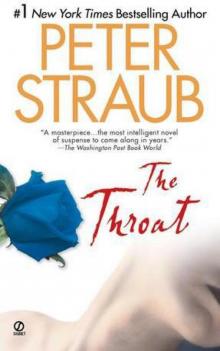 The Throat
The Throat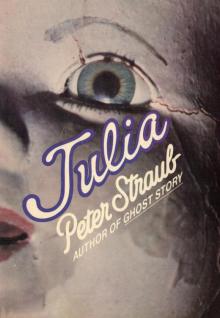 Julia
Julia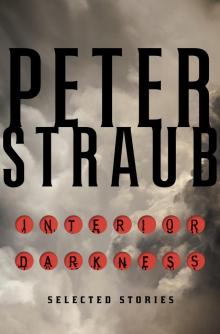 Interior Darkness: Selected Stories
Interior Darkness: Selected Stories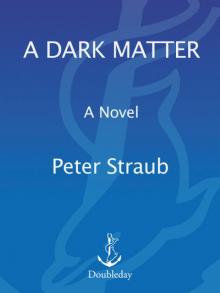 A Dark Matter
A Dark Matter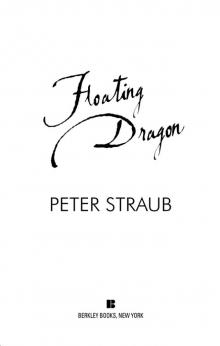 Floating Dragon
Floating Dragon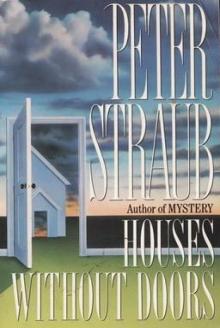 Houses Without Doors
Houses Without Doors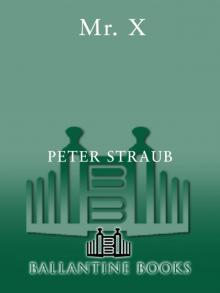 Mr. X
Mr. X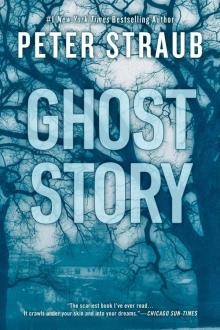 Ghost Story
Ghost Story Mystery
Mystery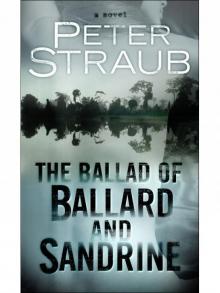 The Ballad of Ballard and Sandrine
The Ballad of Ballard and Sandrine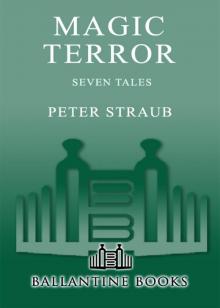 Magic Terror
Magic Terror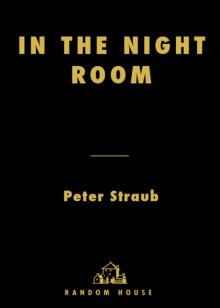 In the Night Room
In the Night Room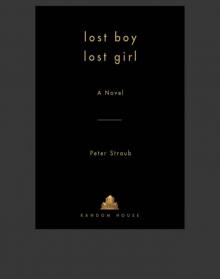 Lost Boy Lost Girl
Lost Boy Lost Girl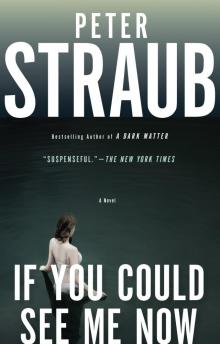 If You Could See Me Now
If You Could See Me Now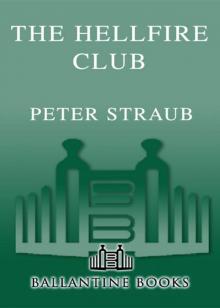 The Hellfire Club
The Hellfire Club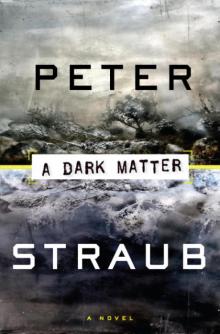 A Dark Matter: A Novel
A Dark Matter: A Novel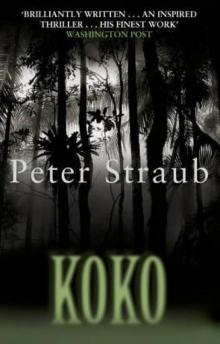 Koko brt-1
Koko brt-1 Shadowland
Shadowland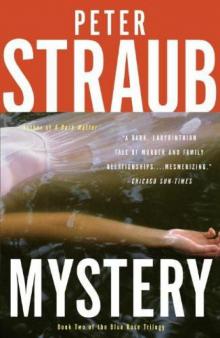 Mystery brt-2
Mystery brt-2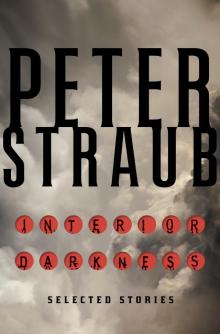 Interior Darkness
Interior Darkness Poe's Children
Poe's Children